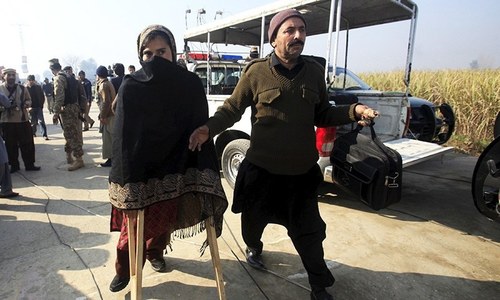ISLAMABAD: Lawmakers in Senate criticised the government and the security establishment over their failure in maintaining peace in the country while calling for a complete review of the National Action Plan after a brazen daylight attack on Bacha Khan University in Khyber Pakhtunkhwa's Charsadda town on Wednesday.
The senators were of the view that if the government had followed the anti-terror plan in letter and spirit, the terror attack on the varsity could have been averted.
Related: APS mastermind claims Bacha Khan University attack, 21 killed
Muttahida Qaumi Movement (MQM) Senator Tahir Mashhadi said intelligence agencies had failed to protect the lives of citizens as the attack occurred despite a high alert.
"A sympathiser of Daesh (Islamic State), Maulana Abdul Aziz, is sitting in the heart of Islamabad but the government has taken no action against him," said Mashhadi.
Senator Usman Kakar also blamed the government for protecting Maulana Abdul Aziz of the Lal Masjid.
Related: Lal Masjid brigade back again
Taking part in the debate, Senator Muhammad Hamza from the treasury also termed the incident a failure of intelligence agencies.
"It is highly regrettable that the government did not call an emergency session of parliament to hold a debate over the attack," said Pakistan Peoples Party (PPP) Senator Sherry Rehman.
Senator Javed Abbasi called for a more lethal operation against militants in Khyber Pakhtunkhwa and stressed the need for talks with extremists.
Senator Sameena Abid criticised the country's top leadership over its bid to mediate between Saudi Arabia and Iran 'without putting its own house in order'.
PPP Senator Aitzaz Ahsan decried what he said was a collective attitude towards extremism and reminded his fellow lawmakers that a sitting minister even sobbed at the death of Tehreek-i-Taliban Pakistan (TTP) chief Hakimullah Mehsud.
Related: Pakistani Taliban chief Hakimullah Mehsud killed in drone attack
At least 21 people were killed when unidentified gunmen entered Bacha Khan University in Khyber Pakhtunkha’s Charsadda town Wednesday and opened fire on students and faculty members.
Security forces fought back and cleared the varsity after an hours long operation, killing all the four attackers who entered the premises.
The mastermind of the APS Peshawar attack, Umar Mansoor, of the banned Tehreek-i-Taliban Pakistan (TTP) Geedar group has claimed the attack through a post on his Facebook page, adding that four attackers were sent to the university.
Prime Minister Nawaz Sharif announced a national day of mourning tomorrow (Jan 21), and the national flag would be lowered to half-mast.
Also Read: 144 Stories: Remembering lives lost in the Peshawar School Attack
NAP and its implementation
After the December 2014 APS tragedy, government had announced a 20-point National Action Plan to deal with terrorism. The 20-point agenda included building of counter-narrative against extremists and banned organisations, repatriation of Afghan nationals, banning hate speech that promotes sectarianism, choking terror financing and establishment of a counter-terrorism force.
Editorial: Action under NAP
The Ministry of Interior and Narcotics Control presented an achievement report about NAP in the National Assembly on January 16, which stated that a total of 2,159 terrorists have been killed and 1,724 arrested by the law enforcement agencies under anti-terror plan.
332 persons had been executed so far under Anti-Terrorism Act (ATA) while 98.3 million SIMs had been blocked for dismantling communication networks of terrorists.
At least 933 URLs and 10 websites of militant organisations have also been blocked by Ministry of Information Technology (MoIT).
2,337 cases were registered for hate speeches and material and 2,195 persons were arrested while 73 shops were sealed.
Likewise, 9,164 cases were registered, 9,340 persons were arrested and 2,452 pieces of equipment confiscated for misuse of loudspeakers. It added, 8,195 persons were included in ‘fourth schedule’ and movement of 2,052 people was restricted as measures against re-emergence of proscribed organisations and individuals.
Uniform registration and data form was developed by Nacta and ITMP and shared with stakeholders for registration and regulation of madressahs. As many as 167 madressahs in Sindh, 13 in Khyber Pakhtunkhwa and two in Punjab were closed.
Also Read: NAP progress not only reason of tension between institutions





















































